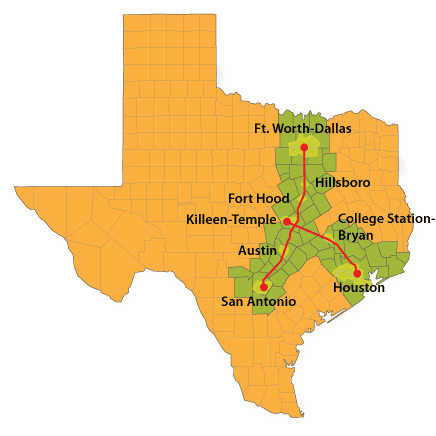Yesterday, Miller-McCune’s Michael Scott Moore accused Southwest Airlines of helping to bury a potential Texas bullet train 15 years ago.

“Southwest understood better than most high-speed rail critics just how well the trains could work,” Moore wrote. “[High-speed rail in Spain] has reduced Spanish highway traffic — even for cargo, by freeing up space on the older rail network — and it’s cut dramatically into domestic airline business.”
Miller-McCune quotes a 2006 story in The Austinist:
Dallas-based airline company Southwest Airlines launched a sweeping, aggressive public relations campaign throughout the state in order to discredit TGV and prevent the company from meeting its fundraising deadlines. Why? Because they dominated (and still dominate) the friendly skies between Dallas, Houston and San Antonio with a business plan identical to the one proposed by TGV. It was their monopolized turf. In a huge state with no other high-speed transportation options available, Southwest Airlines has always been the intra-Texas transport of choice for many people going from city to city who don’t want to make the long drives.
Regional air travel is a significant consideration when assessing a corridor’s potential for high-speed rail, since short-jump flights are so easily replaced with a train that goes as fast, provides more legroom, lets you skip long security lines, and begins and ends in downtowns (not far-flung airports). When America 2050 studied the best potential high-speed rail in the country, the report authors couldn’t help noticing, “Texas has a relatively large short haul air market, with 4.4 million passengers in 2008 moving between Dallas and other points in the Texas Triangle and Gulf Coast.” That factor helped several Texas corridors score high on America 2050’s ranking for rail potential.
The organization also noticed, “To accommodate its fast growing population, Texas has invested billions of dollars over the last decade adding more than 1,000 lane miles of highways and upgrading its major air terminals. Despite this, metropolitan congestion has continued to worsen and the change in congestion in the Houston and Dallas metro regions is among the worst in the nation over the last decade.”
Indeed, while the Miller-McCune story asks why high-speed rail has succeeded in Spain and flopped in Texas, the Austinist story begins with a different premise: Why was Texas (at the time the story was written) prepared to build a Trans-Texas Corridor at a cost of $184 billion, "usurp[ing] nearly 9,000 square miles of mostly privately-owned rural farmland” to build a super-corridor of roads, utility lines and rail 1,200 feet wide?
The Trans-Texas Corridor plan was scrapped last year by the Federal Highway Administration, but the Austinist story still makes a good point: Paralysis on the part of the states to build sophisticated rail networks could eventually lead to highway expansion. Currently, the Obama administration is pushing for a high-speed rail system to connect 80 percent of the U.S. population in 25 years, in part because they’re looking ahead at a 100 million person population increase in the U.S. over the next 40 years. Indeed, if the country doesn’t figure out some adequate way to move people by rail, the grinding traffic on the nation's highways -- and airways -- could get far worse.





